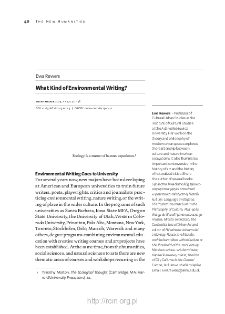- Wyszukaj w całym Repozytorium
- Piśmiennictwo i mapy
- Archeologia
- Baza Młynów
- Nauki przyrodnicze
Wyszukiwanie zaawansowane
Wyszukiwanie zaawansowane
Wyszukiwanie zaawansowane
Wyszukiwanie zaawansowane
Wyszukiwanie zaawansowane

Obiekt
Tytuł: What Kind of Environmental Writing?
Inny tytuł:
Wydawca:
Miejsce wydania:
Opis:
This project was accomplished with funds from the program“Development of Scientific Journals,” awarded by the Ministry of Educationand Science in 2021, decision number rcn/sp/0575/2021/1. ; 21 cm ; Eng. text, eng. summary
Bibliografia:
1. Alagona, P. S. The Accidental Ecosystem. People and Wildlife in American Cities. University of California Press, 2022.
![]()
2. Arnold, A. Climate Change and Storytelling: Narratives and Cultural Meaning in Environmental Communication. Palgrave Macmillan, 2018.
3. Baker, T. C. New Forms of Environmental Writing. Gleaning and Fragmentation. Bloomsbury Academic, 2022.
![]()
4. Bhattacharjee, B. “The Environmental Turn in Literary Theory and Criticism and the ‘Truth of Ecology’: Understanding Ecocriticism.” In Sambalpur Studies in Literatures and Cultures Series 5. Sambalpur University, 2019.
5. Clark, T. Ecocriticism on the Edge: The Anthropocene as a Threshold Concept. Bloomsbury, 2015.
6. Clément, G. Manifeste du Tiers Paysage. Editions du commun, 2020.
7. Clément, G. Manifesto of the Third Landscape, trans. Michele Bee and Raphaël Fèvre. Trans Europe Halle, the.net.
8. Coupe, L. (ed.). The Green Studies Reader. From Romanticism to Ecocriticism. Routledge, 2000.
9. Deleuze, G. and Parnet, C. Dialogues II, trans. Hugh Tomlinson and Barbara Habberjan. Continuum, 2002.
10. Dwyer, J. Where the Wild Books Are: A Field Guide to Ecofiction. University of Nevada Press, 2010.
11. Emmett, R. S. and Nye, D. E. The Environmental Humanities. A Critical Introduction. MIT Press, 2017.
![]()
12. Gurowska, M., Rosińska, M. and Szydlowska, A. ZOEpolis. Budując wspólnotę ludzko-nie-ludzką. Fundacja Bęc Zmiana, 2020.
13. Hall, E. T. Beyond Culture. Anchor Books, Doubleday, 1976.
14. Haraway, D. The Companion Species Manifesto. Dogs, People, and Significant Otherness. Prickly Paradigm Press, 2003.
15. Hiltner, K. “General Introduction.” In Ecocriticism. The Essential Reader, ed. K. Hiltner. Routledge, 2015.
16. Hinchliffe, S. Geographies of Nature: Societies, Environments, Ecologies. Sage, 2007.
![]()
17. Le Guin, U. K. “Deep in Admiration.” In Arts of Living on a Damaged Planet, ed. A. Tsing. University of Minnesota Press, 2017.
18. Miller, R. E. and Spellmeyer, R. (eds). The New Humanities Reader. Wadsworth Cengage Learning, 2012.
19. Morton, T. Ecology without Nature, Rethinking Environmental Aesthetics. Harvard University Press, 2007.
![]()
20. Morton, T. The Ecological Thought. Harvard University Press, 2010.
21. Purdy, J. After Nature. A Politics for the Anthropocene. Harvard University Press, 2015.
![]()
22. Robbins, P. and Marks, B. “Assemblage Geographies.” In The Sage Handbook of Social Geographies, ed. S. J. Smith, Rachel Pain, J. P. Jones and Sallie Marston. Sage, 2009.
![]()
23. Rueckert, W. “Literature and Ecology: An Experiment in Ecocriticism.” In The Ecocriticism Reader: Landmarks in Literary Ecology, ed. Ch. Glotfelty and H. Fromm. University of Georgia Press, 1996.
24. Scruton, R. Zielona filozofia. Jak poważnie myśleć o naszej planecie, trans. J. Grzegorczyk, R. P. Wierzchosławski. Wydawnictwo Zysk i S-ka, 2017.
25. Taine, H. Voyage aux Pyrénées. Monhelios Edition, 2002.
26. Taine, H. Voyage en Allemagne, (1870). Create Space Independent Publishing Platform, 12017.
27. Taine, H. Voyages en Italie. Bartillat, 2018.
Czasopismo/Seria/cykl:
Zeszyt:
Strona pocz.:
Strona końc.:
Szczegółowy typ zasobu:
Identyfikator zasobu:
oai:rcin.org.pl:242616 ; 0867-0633 ; 10.18318/td.2023.en.2.3/
Źródło:
IBL PAN, call no. P.I.2524 ; kliknij tutaj, żeby przejść
Język:
Język streszczenia:
Prawa:
Creative Commons Attribution BY 4.0 license
Zasady wykorzystania:
Copyright-protected material. [CC BY 4.0] May be used within the scope specified in Creative Commons Attribution BY 4.0 license, full text available at: ; -
Digitalizacja:
Institute of Literary Research of the Polish Academy of Sciences
Lokalizacja oryginału:
Library of the Institute of Literary Research PAS
Dofinansowane ze środków:
Programme Innovative Economy, 2010-2014, Priority Axis 2. R&D infrastructure ; European Union. European Regional Development Fund
Dostęp:
Kolekcje, do których przypisany jest obiekt:
- Repozytorium Cyfrowe Instytutów Naukowych > Kolekcje Partnerów > Instytut Badań Literackich PAN
- Repozytorium Cyfrowe Instytutów Naukowych > Kolekcje Partnerów > Instytut Badań Literackich PAN > Czasopisma
- Repozytorium Cyfrowe Instytutów Naukowych > Piśmiennictwo
- Repozytorium Cyfrowe Instytutów Naukowych > Piśmiennictwo > Czasopisma/Artykuły
Data ostatniej modyfikacji:
22 lis 2024
Data dodania obiektu:
22 lis 2024
Liczba pobrań / odtworzeń:
7
Wszystkie dostępne wersje tego obiektu:
https://rcin.org.pl./publication/279483
Wyświetl opis w formacie RDF:
Wyświetl opis w formacie RDFa:
Wyświetl opis w formacie OAI-PMH:
| Nazwa wydania | Data |
|---|---|
| Rewers E. - What Kind of Environmental Writing? | 22 lis 2024 |
Obiekty Podobne
Sendyka, Roma
Nycz, Ryszard
Szczęsna, Ewa
Cieński, Marcin

 INSTYTUT ARCHEOLOGII I ETNOLOGII POLSKIEJ AKADEMII NAUK
INSTYTUT ARCHEOLOGII I ETNOLOGII POLSKIEJ AKADEMII NAUK
 INSTYTUT BADAŃ LITERACKICH POLSKIEJ AKADEMII NAUK
INSTYTUT BADAŃ LITERACKICH POLSKIEJ AKADEMII NAUK
 INSTYTUT BADAWCZY LEŚNICTWA
INSTYTUT BADAWCZY LEŚNICTWA
 INSTYTUT BIOLOGII DOŚWIADCZALNEJ IM. MARCELEGO NENCKIEGO POLSKIEJ AKADEMII NAUK
INSTYTUT BIOLOGII DOŚWIADCZALNEJ IM. MARCELEGO NENCKIEGO POLSKIEJ AKADEMII NAUK
 INSTYTUT BIOLOGII SSAKÓW POLSKIEJ AKADEMII NAUK
INSTYTUT BIOLOGII SSAKÓW POLSKIEJ AKADEMII NAUK
 INSTYTUT CHEMII FIZYCZNEJ PAN
INSTYTUT CHEMII FIZYCZNEJ PAN
 INSTYTUT CHEMII ORGANICZNEJ PAN
INSTYTUT CHEMII ORGANICZNEJ PAN
 INSTYTUT FILOZOFII I SOCJOLOGII PAN
INSTYTUT FILOZOFII I SOCJOLOGII PAN
 INSTYTUT GEOGRAFII I PRZESTRZENNEGO ZAGOSPODAROWANIA PAN
INSTYTUT GEOGRAFII I PRZESTRZENNEGO ZAGOSPODAROWANIA PAN
 INSTYTUT HISTORII im. TADEUSZA MANTEUFFLA POLSKIEJ AKADEMII NAUK
INSTYTUT HISTORII im. TADEUSZA MANTEUFFLA POLSKIEJ AKADEMII NAUK
 INSTYTUT JĘZYKA POLSKIEGO POLSKIEJ AKADEMII NAUK
INSTYTUT JĘZYKA POLSKIEGO POLSKIEJ AKADEMII NAUK
 INSTYTUT MATEMATYCZNY PAN
INSTYTUT MATEMATYCZNY PAN
 INSTYTUT MEDYCYNY DOŚWIADCZALNEJ I KLINICZNEJ IM.MIROSŁAWA MOSSAKOWSKIEGO POLSKIEJ AKADEMII NAUK
INSTYTUT MEDYCYNY DOŚWIADCZALNEJ I KLINICZNEJ IM.MIROSŁAWA MOSSAKOWSKIEGO POLSKIEJ AKADEMII NAUK
 INSTYTUT PODSTAWOWYCH PROBLEMÓW TECHNIKI PAN
INSTYTUT PODSTAWOWYCH PROBLEMÓW TECHNIKI PAN
 INSTYTUT SLAWISTYKI PAN
INSTYTUT SLAWISTYKI PAN
 SIEĆ BADAWCZA ŁUKASIEWICZ - INSTYTUT TECHNOLOGII MATERIAŁÓW ELEKTRONICZNYCH
SIEĆ BADAWCZA ŁUKASIEWICZ - INSTYTUT TECHNOLOGII MATERIAŁÓW ELEKTRONICZNYCH
 MUZEUM I INSTYTUT ZOOLOGII POLSKIEJ AKADEMII NAUK
MUZEUM I INSTYTUT ZOOLOGII POLSKIEJ AKADEMII NAUK
 INSTYTUT BADAŃ SYSTEMOWYCH PAN
INSTYTUT BADAŃ SYSTEMOWYCH PAN
 INSTYTUT BOTANIKI IM. WŁADYSŁAWA SZAFERA POLSKIEJ AKADEMII NAUK
INSTYTUT BOTANIKI IM. WŁADYSŁAWA SZAFERA POLSKIEJ AKADEMII NAUK




































